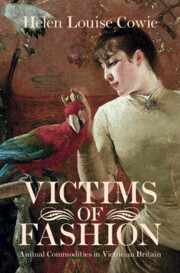‘From civets horribly confined to produce perfume scent to elephants killed for ivory billiard balls and piano keys, Cowie demonstrates how fashion “valued” animals, even while letters to the RSPCA illustrated concern for animal agency and welfare. Contemporary debates surrounding nonhuman animals' victimization are rooted in the human animal's propensity to display.'
Abel Alves - Ball State University
‘This remarkably powerful and elegantly crafted book explores the appeal of animal-based products in Victorian and Edwardian Britain. Taking us deep into the world of trading and consuming bird feathers, seal skins, ivory, and exotic pets, Victims of Fashion brims with historical insight about the consumption of these goods, but also, importantly, their decline in popularity.'
Neil Pemberton - University of Manchester
‘This is a fascinating book from start to finish, written with great verve and clarity. From animal acclimatisation schemes to exotic pet keeping, and from campaigns against animal cruelty and ‘murderous millinery' to the beginnings of international wildlife conservation action, or the hunt to find synthetic substitutes for animal products, it sets some of the key questions of our time in a vivid historical context.'
Sally Shuttleworth - University of Oxford
‘This terrific book exposes how far elites were implicated in systemised animal cruelty (historically associated with the working classes) and illustrates that while women often were pioneering advocates of animal rights, they also constituted core markets for animal commodities.'
Julie-Marie Strange - Durham University
‘Victims of Fashion is a terrific addition to a number of fields, including environmental history, history of technology, commodity studies, and histories of consumer culture. It uses a wide variety of archival sources to address a fascinating and interdisciplinary topic, and the individual chapters would also make excellent, concise reading assignments for students … I would highly recommend this book for scholars in history of science, environmental history, histories of consumption and dress, and any one interested in questions of sustainability in a global context.’
Sarah Pickman
Source: H-Environment
‘Featuring excellent and varied illustrations, by tracing the global impact of the trade in animal commodities in nineteenth-century Britain this highly informative book makes an important contribution to expanding awareness of the victims of empire.’
Pandora Syperek
Source: Archives of Natural History
‘A rich and impressive book, a much-needed account of the development of the global entanglement of humans and non-human animals in modern times, with vital relevance to our own age and to our own lives.’
Philip Howell
Source: Journal of Modern History
‘If the mark of scholarship worth producing in the 2020s is that it bears at least some relevance to everyday life - and I would argue that it is - Cowie’s book has much to teach us … It is incredibly refreshing to read a monograph that not only bridges the gap between the Victorian period and the present, but also offers hope in the process.’
Michelle M. Taylor
Source: Victorian Studies



